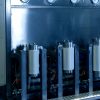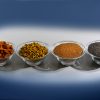The technology of which Exenia is equipped is very flexible due to the process characteristics of converting gases into supercritical fluids. The passage from one state of matter to another, through the modulation of pressure and temperature, allows to obtain an apolar fluid with characteristics of density (obtained by means of high pressure) and of temperature which may be the most suitable for solubilizing and extract the compounds of interest. It is thus possible to process different vegetable flours to obtain oils on one side (wheat germ, almond seeds, hemp seeds, hazelnut seeds, soybeans) and flour on the other which, having a low level of fat suitably modulated , can be defined as light. The flexibility of this technology therefore allows circularity to be applied to the food industry first of all.
This application allows great progress in the production and management of waste. In fact, one of the first applications of circular productivity in industry dates back to the 1980s, when supercritical CO2 was used in the decafeinization processes of coffee to obtain decaffeinated coffee on one side, and on the other caffeine in crystals to use in energy drinks rather than in the cosmetics.


